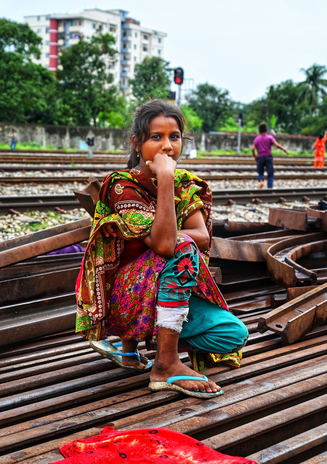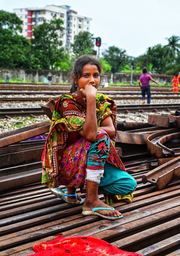Conceal
I peer out the wooden window
Of the house we had built using bamboo and straw.
The sky is a deep red,
As if the Heavens are bleeding,
And I don’t know if those are clouds
Or if they’re smoke.
My youngest crawls over to me,
Her hands dark from the dusty dirt that is the ground of our abode.
She reaches up and grabs at nothing.
I pick her up, my hips aching,
And clean her hands using the edge of my saree.
I look at her with glassy eyes.
She peers at me and just barely opens her mouth.
She whispers, “Baba kotai?”
I too am wondering where her father is.
But I already have an idea.
It is the 24th of March, 1971-
Only a matter of time before chaos ensues.
The breeze from outside runs through the window,
Carrying over the smell of firewood remnants.
Our two cows start mooing loudly.
I look up again.
There her father is,
Trudging over with a cane and bare feet.
He sees me. He frowns.
He sees our daughter. He forces a smile.
She looks up and opens her mouth wide: “Baba’s home!”
Six pairs of feet run from the room over.
The oldest opens the door with excited eyes,
But once he sees his father,
His eyes dull.
He turns his head to look at me.
I try my best to keep my expression blank.
He turns back to his father and opens his mouth,
His eyebrows furrowed and face inquisitive.
His father raises his hand to silence him before one sound escapes.
Everything falls silent,
The ambiance holding its breath.
All seven children look between me and their father.
“It’s time for prayer,” I whisper. They nod.
My husband and two oldest place the long rug on the ground,
Facing the corner of the room.
My husband stands at the very front,
The boys behind him, and
The girls and myself behind the boys.
He raises his hands to the sides of his face
And, in a quivering yet strong voice, says, “Allahu Akbar.”
The next day, I rise early
And fill my large woven, straw bag with clothes for seven.
I wake my oldest and motion the bag towards him.
He looks at me with unfocused eyes,
Swallowing his spit,
And reaches for the handles with trembling hands.
I affectionately ruffle his hair and tap his chin,
And don’t bother faking a smile.
He wakes the others, and declares,
“We are going on an adventure today!”
He feigns excitement and claps his hands.
The four youngest cheer. The other two look at me.
I turn away.
Their father comes, then, a corner of his mouth curling slightly.
“Listen to your Bhi, today. If you do, you will get a surprise.”
Hours pass, it is now dusk,
But the sky is still wounded.
The cows start mooing again, louder, louder.
Several furious knocks shake our wooden door.
I sit in the corner of the room and hold my face in my hands,
My eyes peeking through the spaces between my fingers.
Impatient, the door is kicked open.
My husband rushes out and stands tall.
“Is there a problem?” He grits.
The men at the door grab the collar of his shirt.
“Watch your tone.”
One of the men glances at me.
“Any children?” he asks.
“My wife is sick. She has not given birth,” my husband chokes out,
The air slowly leaving him as the grip on his collar is not released.
The man begins to approach me, anyway.
I uncover my face and hunch back,
Then lunge forward,
And erupt into a vivacious laugh.
I laugh, harder, harder.
There are tears streaming down my face
From the ache in my chest,
As I keep thinking
About the children,
Who would no longer be able to steal the neighbor’s jackfruit,
Boisterous laughs signifying their mischief,
As they run towards the river at the edge of the woods.
About the land,
That appears ethereal on normal days:
Verdant grass with blades as silken as eyelashes,
And ponds kissed by the sunrays,
Inhabiting water lilies and fishermen on wooden rowboats.
About the language,
That unites us all together.
The jackfruits will become rotten,
And it’s too dangerous to let the children wander on their own.
The grass will wither into hay,
And the ponds will only be infested with dead fish.
The language will die,
And our history will be erased.
The man steps back.
I tear the edge of my saree and keep laughing.
There is a hint of a smile on my husband’s face.
“I told you so,” he struggles to smirk.
The men glare at him, their faces turning blood-red.
They push him against the wall and tie his arms back.
I stop laughing.
The men look back at me.
“At least you won’t have to worry about her anymore.”
They leave, slamming the broken door behind them.
The cows keep mooing, the breeze keeps running,
I sit still.
A few more hours pass.
“Ammu! We’re back! We went fishing and cooked using a fire,
Just like you and Baba!”
The youngest shimmies out of the hold of one of my children,
And crawls over to me.
She places herself on my lap.
She looks around.
“Baba kotai?” she whispers.
I close my eyes.
In memory of the Bangladesh Liberation War: March 26th, 1971 – Dec. 16th, 1971


